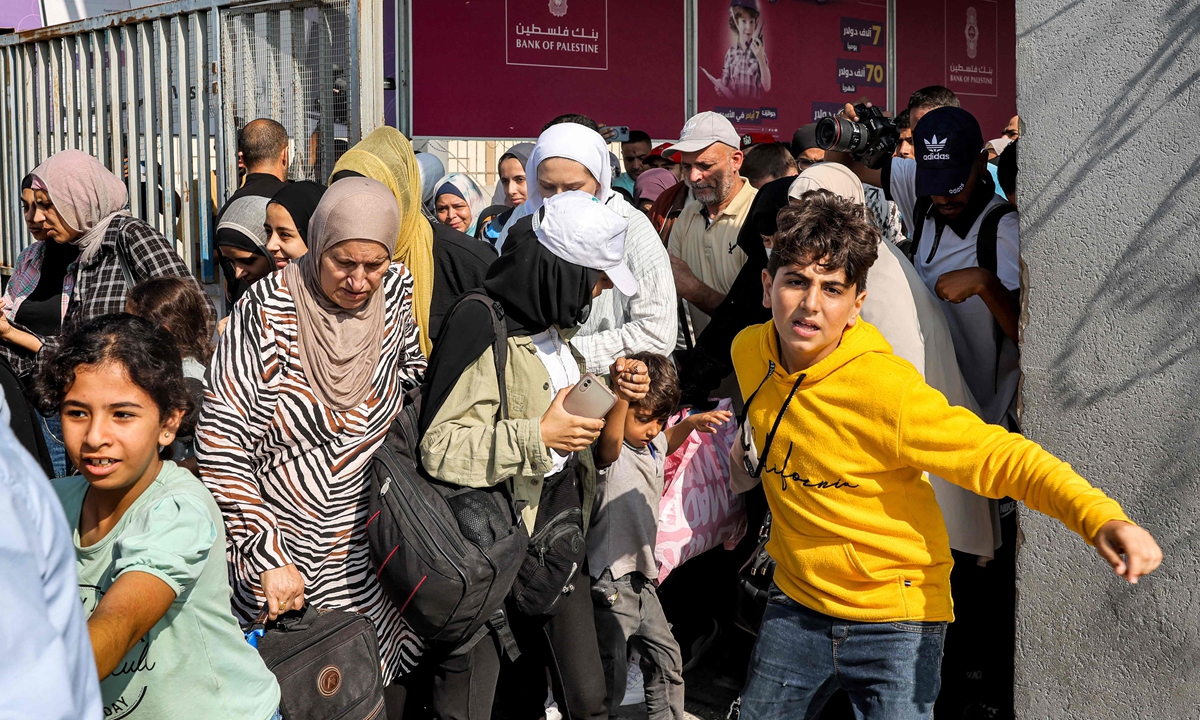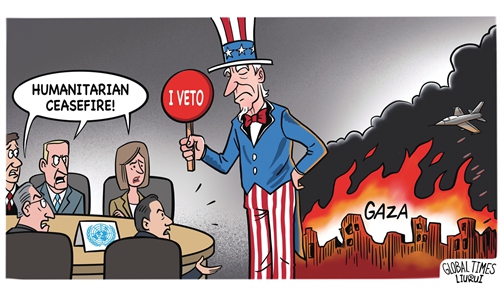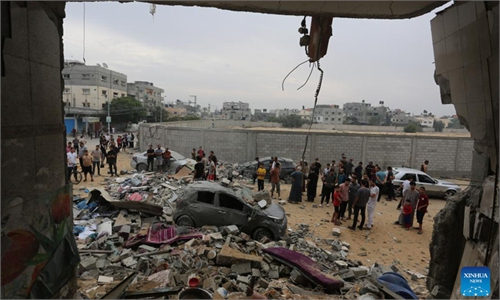
People walk through a gate to enter the Rafah border crossing to Egypt in the southern Gaza Strip on November 1, 2023. Scores of foreign passport holders trapped in Gaza started leaving the war-torn Palestinian territory on November 1 when the Rafah crossing to Egypt was opened up for the first time since October 7. Photo: VCG
The international pressure to push Israel to stop collective punishment in the Gaza Strip has been mounting with the death toll of this round of conflict surpassing 10,000. Following Bolivia's decision to suspend ties with Israel, analysts said other nations would move to apply diplomatic pressure on Israel and the US to allow a truce.
At a news conference on Tuesday, Bolivia's deputy foreign minister Freddy Mamani Machaca stated that his nation "decided to break diplomatic relations with the Israeli state in repudiation and condemnation of the aggressive and disproportionate Israeli military offensive taking place in the Gaza Strip." According to media reports, two other South American countries, Colombia and Chile, have recalled their ambassadors from Israel.
Jordan on Wednesday recalled its ambassador to Israel in protest of Jerusalem's conduct in the war against Hamas, the foreign ministry in Amman announced, media reported.
Bolivia was one of the first nations to sever diplomatic ties with Israel in response to the latter's military activities in Gaza. Together with Chile and Colombia, their actions aim to express discontent to Israel's collective punishment of Palestinians in the Gaza Strip and show solidarity and support for the Palestinian people, Tian Wenlin, a professor at School of International Studies of the Renmin University of China, told the Global Times on Wednesday.
In 2009, under the government of leftist President Evo Morales, Bolivia also cut ties with Israel in protest against Israel's actions in Gaza. In 2020, the government of right-wing interim President Jeanine Anez reestablished the ties. Bolivia, Chile and Colombia all have leftist governments.
On Wednesday, Israel's Ministry of Foreign Affairs spokesperson Lior Haiat said in a post on X that Bolivia is aligning itself with Hamas.
Many of the leftist governments and leaders in the area have chosen to support the underprivileged and base their diplomatic decisions on justice. Moreover, as the Global South has grown and the West declines, more countries from the Global South are gaining strategic autonomy and fighting to protect international law's legitimacy and fairness, said Tian.
Bolivia, Chile, and Colombia have all brought up the important topic of international law in relation to the current state of affairs in Gaza. For example, Chile Foreign Ministry said in a statement that it decided to recall its ambassador "in the face of the unacceptable violations of international humanitarian law committed by Israel in the Gaza Strip."
Although these are drastic measures to express disapproval of Israel's activities, severing ties and withdrawing diplomats are not uncommon in the Middle East. Also, nations whose relations with Israel are frozen may decide to do the same, said Tian.
In addition, Arab nations with diplomatic ties to Israel would come under increased pressure if the humanitarian situation in Gaza worsened. It's also possible that some of these nations may sever ties with Israel in order to placate domestic public sentiment, said the expert.
For Arab nations that maintain diplomatic relations with Israel, deciding whether to sever ties can be more difficult because normalizing relations required a lot of work and they must also take the US into account. However, it is obvious that future negotiations between Israel and other Arab nations on normalization will be more challenging, Li Weijian, a research fellow with the Institute for Foreign Policy Studies of the Shanghai Institutes for International Studies, told the Global Times.
Before Hamas' sudden attack at Israel on October 7, Saudi Arabia and Israel were on a US-brokered negotiation on normalization of relations. However, Saudi Arabia decided to pause the negotiation and informed US officials, AFP reported on October 14.
Growing call for ceasefire
As of press time on Wednesday, the death toll from both Gaza and Israel has surpassed 10,000 in this round of conflict. According to the Health Ministry in Gaza, 8,525 have died and among them, 3,542 were children and 2,187 women, while 21,543 other people were injured.
Israel continued its ground operation in Gaza. On Tuesday, an Israeli air strike is reported to have killed 50 people at Jabalia refugee camp in northern Gaza, according to the Gaza-based health ministry. But a nearby hospital said it received 400 casualties, including 120 dead.
On Tuesday, the Arab world condemned Israeli airstrikes on the refugee camp. In a Foreign Ministry statement, the United Arab Emirates condemned "the severity of the bombing carried out by Israel on the Jabalia camp in the Gaza Strip, stressing that "the continuation of the senseless bombing will lead the region to repercussions that are difficult to remedy."
Chinese Foreign Ministry Spokesperson Wang Wenbin said on Wednesday that China is shocked with the great casualties of civilians in the airstrike and strongly condemns such action.
China urges all parties concerned, especially the Israeli side, to maintain maximum calm and restraint, effectively implement the UN General Assembly resolution adopted on October 27, immediately cease fire, fully protect civilians, open up corridors for humanitarian assistance as soon as possible, and avoid an even worse humanitarian disaster, Wang said.
Wang emphasized that China will continue to play an active and constructive role in promoting ceasefire, ensuring the safety of civilians, and pushing for an early comprehensive, just, and lasting settlement of the Palestinian question within the United Nations Security Council.
While China and the international community are intensifying efforts in pushing for a ceasefire, the US continues its one-sided support to Israel. National Security Council spokesperson John Kirby told reporters on Monday that the US does not believe that a ceasefire "is the right answer right now."
The US has been feeling greater stress from the international community as criticism of the Biden administration on the issue has grown, said Li.
There have been growing protests against US' one-sided backing of Israel in recent days. On Tuesday, demonstrators covered in fake blood disrupted US Secretary Antony Blinken's hearing on Israel in order to demand a ceasefire in Gaza and demand that the US halt "supporting genocide," causing disruption in the US Congress, according to media reports.
Israel may continue its operations in the Gaza Strip with the aim of destroying Hamas, but it will encounter additional challenges, including the moral weight of mounting international criticism and the challenges of conducting ground operations in Gaza. Israel may decide to cease if the ground operation has not gone well and resulted in significant losses, but it won't stop for now, said Tian
According to some observers, ongoing military operations in Gaza would only worsen the humanitarian issue and harm Israel's reputation internationally. More humanitarian catastrophe in Gaza is poised to occur as the US takes little action to halt it.
The US, the EU and the rest of the international community are deeply divided on the Israeli-Palestinian conflict. The world is also made aware of the US and the West's double standards and hypocrisy by the stark contrast between their actions and their boasts of human rights, said Tian, noting that the US has completely lost its credibility.


